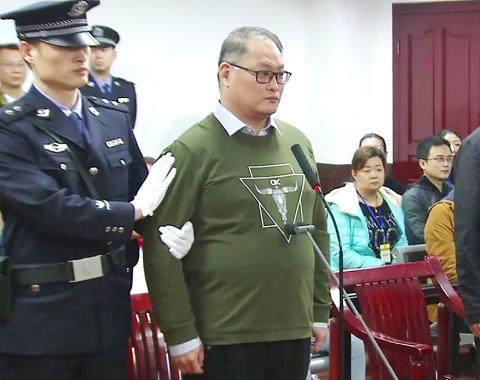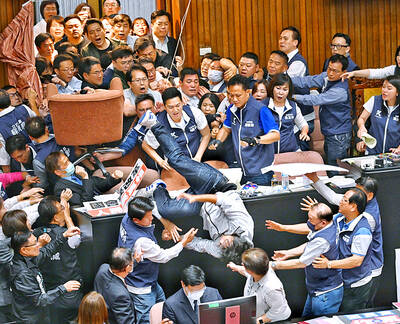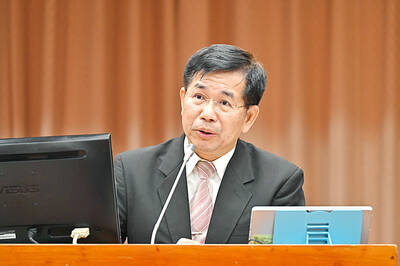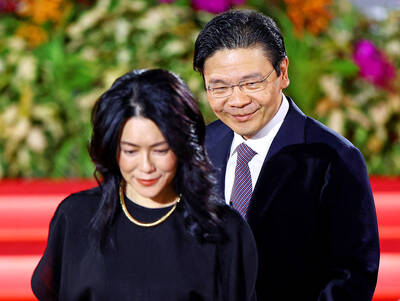Taiwan yesterday condemned the conviction of Taiwanese human rights advocate Lee Ming-che (李明哲) by a Chinese court, saying it is “unacceptable” that Lee should be found guilty of state subversion for advocating democracy and freedom.
“The nation cannot accept that Lee Ming-che has been convicted of such a crime as state subversion for sharing the ideas of democracy and freedom,” Presidential Office spokesman Alex Huang (黃重諺) said, calling for Lee’s immediate release.
Lee’s case has greatly damaged cross-strait relations and threatened Taiwanese belief in freedom and democracy, Huang said.

Photo: AFP / Yueyang Intermediate People’s Court
The Mainland Affairs Council also condemned the verdict, saying Lee’s online exchanges with his Chinese friends were an innocent effort to share Taiwan’s democratic experience, which did not compromise China’s safety and security in any way.
It was also unacceptable that former Democratic Progressive Party (DPP) legislator Wang Li-ping (王麗萍), who accompanied Lee’s wife, Lee Ching-yu (李凈瑜), to Yueyang, Hunan Province, to hear the verdict, was denied entry and deported, the council said.
China should ensure the safety of Lee Ching-yu and members of her group and their return to Taiwan, the council said.
It should also ensure Lee Ming-che’s health and right to family visits during his confinement, it said, adding that the government would continue its efforts to seek his return.
Politicians across party lines also condemned the verdict and urged the government to safeguard the rights of Taiwanese.
“There should not be, and could not possibly be, political prisoners in a truly democratic, free and law-observing country,” the DPP said in a statement.
The verdict “indicates China’s indifference to the universal values of democracy and human rights, and damages its international reputation, while hurting the feeling of Taiwanese,” the DPP said.
Beijing should respect Taiwan’s belief in democracy and freedom, as Chinese President Xi Jinping (習近平) said during the Chinese Communist Party’s (CCP) 19th National Congress last month, the DPP said.
The Chinese Nationalist Party (KMT) said the council needs to step in wherever Lee Ming-che’s rights are compromised during and after the trial, even though cross-strait relations and communication have cooled since the DPP administration took office.
The DPP administration would be sacrificing people’s rights for its ideology if it fails to communicate with Beijing over Lee’s condition, KMT spokesman Hung Meng-kai (洪孟楷) said.
The New Power Party (NPP) urged the government to take a tougher stance against China as cross-strait agreements are ineffective in Lee’s case, and passivity would only compromise personal freedom and the freedom of expression of Taiwanese.
Lee Ming-che is innocent and the Chinese government is guilty of illegally detaining him, violating human rights and cracking down on political dissidents, the NPP said.

MUSICAL INTERLUDE: During the altercations, KMT Legislator Hsu Chiao-hsin at one point pulled out a flute and started to play the national anthem A massive brawl erupted between governing and opposition lawmakers in the main chamber of the legislature in Taipei yesterday over legislative reforms. President-elect William Lai (賴清德) is to be inaugurated on Monday, but his Democratic Progressive Party (DPP) lost its majority in the legislature and the Chinese Nationalist Party (KMT) has been working with the Taiwan People’s Party (TPP) to promote their mutual ideas. The opposition parties said the legislative reforms would enable better oversight of the Executive Yuan, including a proposal to criminalize officials who are deemed to make false statements in the legislature. “The DPP does not want this to be

The International Industrial Talents Education Special (INTENSE) Program to attract foreigners to study and work in Taiwan will provide scholarships and a living allowance of up to NT$440,000 per person for two years beginning in August, Minister of Education Pan Wen-chung (潘文忠) told a meeting of the legislature’s Education and Culture Committee yesterday. Pan was giving an update on the program’s implementation, a review of universities’ efforts to recruit international students and promotion of the Taiwan Huayu Bilingual Exchanges of Selected Talent (BEST) program. Each INTENSE Program student would be awarded a scholarship of up to NT$100,000 per year for up to

Singapore yesterday swore in Lawrence Wong (黃循財) as the city-state’s new prime minister in a ceremony broadcast live on television after Lee Hsien Loong (李顯龍) stepped down following two decades in office. Wong, formerly deputy prime minister, was inaugurated at the Istana government office shortly after 8pm to become the second person outside the Lee family to lead the nation. “I ... do solemnly swear that I will at all times faithfully discharge my duties as prime minister according to law, and to the best of my knowledge and ability, without fear or favor, affection or ill-will. So help me God,” the

BASIC OPERATIONS: About half a dozen navy ships from both countries took part in the days-long exercise based on the Code for Unplanned Encounters at Sea An unpublicized joint military exercise between Taiwan and the US in the Pacific Ocean last month was carried out in accordance with an international code, the Ministry of National Defense (MND) said yesterday. According to a Reuters report citing four unnamed sources, the two nations’ navies last month conducted joint drills in the Western Pacific. The drills were not made public at the time, but “about half-a-dozen navy ships from both sides, including frigates and supply and support vessels, participated in the days-long exercises,” Reuters reported, citing the sources. The drills were designed to practice “basic” operations such as communications, refueling and resupplies,